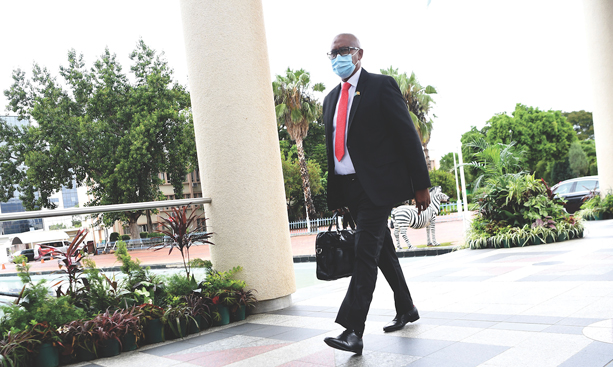- Worst economic depression looms, Govt retrenches
- After a bruising 2020, huge taxes to impoverish ordinary citizens
- Alcohol ban haunts government coffers
BAKANG TIRO
editors@thepatriot.co.bw
The Deputy Secretary General of Botswana Federation of Public, Private and Parastatal Workers Union (BOFEPUSU) Ketlhalefile Motshegwa said government intention to retrench workers is bad move.
Motshegwa said the pronouncement by Matsheka that 50% of government vacant posts will be scrapped off would result in a serious economic depression amidst higher unemployment level. He is worried that the country would be thrown deeper into economic depression adding that Botswana doesn’t have a large vibrant private sector that create jobs while government cannot.
“Government is the largest employer in Botswana and for it to freeze jobs means that there is a lot problems. The government has over the years decried high wage bill. The research we have conducted shows that the super scale public servants in E and F earn a lot hence this is hitting hard on the government coffers. Taxes and levies will affect workers negatively too,” he said, adding that the issue of underperforming parastatals is fueled by poor governance.
According to Motshegwa, incompetent people are appointed to the boards not based on merit but on nepotism or political connections therefore it opens room for poor governance leading to crisis. He added that lack of decent living wage would also be another pandemic on the workers who are already earning nothing as government is milking them through high taxes.
Even the current minimum wage is not matching the standard of cost of living which is high, he said. “It is imminent that food, fuel, and transport prices will go higher when tax and levy rates come effective in April.
Economic woes
With the government considers raising taxes and levies to cushion against effects of Covid-19 pandemic, this according to experts may throw a now bedridden economy into great depression.
The Minister of Finance and Economic Development Dr Thapelo Matsheka announced increase of taxes and levies amid the hard times presented by Covid-19 therefore igniting public outrage.
That being the case, economic experts warn Botswana is in midst of worst economic crisis ever.
Botswana’s economy was pushed deeper into a contraction earlier in the first quarter of 2020, with the full force of Covid-19 virus at the moment threatening to batter the now ailing economy.
Commenting on the budget speech, the Managing Partner at Grant Thornton Botswana Kalyanaraman Vijay, said the rate of unemployment caused by lack of skills or sluggish economy is a big worry.
Vijay says Botswana traditionally has very low taxes in the region noting that the decision now by government to increase taxes could be a way of rectifying economic crisis caused by Covid-19.
Jonathan Hore, Managing Tax Consultant- Aupracon Tax Specialists and economist said the government didn’t want to hike taxes as minister Matsheka had stated in 2020\2021 financial year budget speech.
“Instead he wanted to increase the tax collection efficiency by BURS but Covid-19 happened and it attacked the main sources of revenue being mineral receipts, SACU and local taxes such as VAT due to the inevitable lockdowns, border closures and a tourism drought,” said Hore.
Due to the pressure, Hore said there was no option but do the unplanned which necessitated tax increases. He added that the magnitude of the tax collections may be negatively affected should COVID-19 continue to disrupt the economy. “But it is worth noting that whilst VAT increase will squeeze the ordinary citizens pockets, the government is balancing that by reducing personal income tax by increasing the exemption threshold from P3000 per annum to P4000.All tax payers will get to pay less tax and thus get compensated for the loss from VAT increases,’’ he added.
Alcohol ban
Hore says that while alcohol levy is on the major revenue source for government, the quantum is not easy to determine how much government could have lost from the alcohol levy due to ban.
But, it is given that the alcohol levy collections will do tumble due to the trade bans, he averred. He said that also constrains tax collection efforts but is a sacrifice worth taking that it save lives.
In 2008, government imposed 30% tax levy on all alcohol products to deal with the problematic drinking in the country and the levy was initially set to be at 70% but it was reduced to the 30%.
Government early in 4January 2021 imposed alcohol ban in effort to curb the spread of the virus and the ban has been extended to end of this month with fears that it would add more harm to economy. A three months alcohol ban was also imposed in April to June last year during the nationwide lockdown.
National beer brewing company, Kgalagadi Breweries Limited (KBL) has raised concerns that the ban is negatively impacting on its business with the latter shown intention to cease operations.
Efforts to reach Head Corporate Affairs at KBL Masegonyana Madisa were futile at press time.
